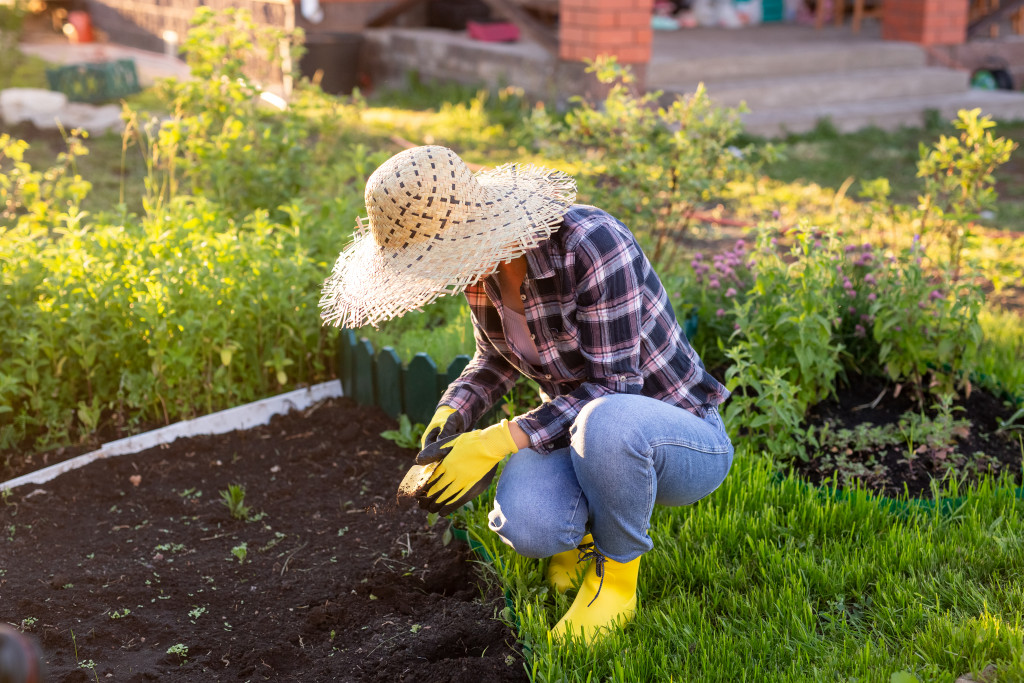- Testing soil nutrient content is essential to ensure the necessary fertility levels.
- Organic matter and commercial fertilizers can improve soil quality and promote healthy plant growth.
- Choose plants that are native and drought-tolerant to survive in different climates.
- Regular garden maintenance is required to keep plants healthy, such as watering and pruning.
- Gardening has numerous health benefits, including reducing stress and improving mental well-being.
Having a garden in your home can help improve the air quality within your abode, making it healthier and cleaner for you and your family to breathe. Studies have shown that having green vegetation such as trees, shrubs, and grass around our homes helps reduce air pollutants like dust particles and ozone. One study found that plants can remove up to 87% of volatile organic compounds (VOCs) from the air. Additionally, planting trees has significantly reduced noise pollution, allowing you to enjoy more peace in your home.
The presence of a garden also brings several other benefits, including reducing stress levels by providing a calming environment where you can relax after a hectic day. It is also an excellent way to save energy and money by reducing the need for air conditioning, as plants help cool down the surrounding air. Furthermore, a garden encourages outdoor activities like gardening or simply sitting in the sun, which can contribute to improved physical health.
Having a garden has its advantages not just for people but also for the environment. Planting trees can reduce carbon dioxide emissions from cars and industry, helping to make the air you breathe healthier. They also act as natural water filters, trapping pollutants that may enter our waterways and soil. In addition, gardens provide habitats for birds and other wildlife that are essential in keeping our ecosystems balanced.
As a result, you might have to consider ways to add a garden to your home. Here are a few steps to help you build it.
Creating a Fertile Ground

Having fertile ground is essential for your garden to thrive and bloom. Good soil should be nutrient-rich, with moisture content that helps the roots absorb nutrients and water quickly. Here is how you can prepare your land for planting:
Test Soil Nutrient Content
To ensure your soil has the necessary nutrient content, have it tested by a professional or use home testing kits from local nurseries. This will help you determine what type of fertilizers need to be added to enhance its fertility levels.
Add Organic Matter
Adding organic matter such as compost, manure, or peat moss can significantly improve the quality of your soil by providing nutrients and increasing its water-holding capacity.
Amend with Nutrients
You can supplement your soil’s nutrient content by adding nitrogen, phosphorous, and potassium as commercial fertilizers. This will help promote healthy plant growth and improve yields.
Improve Drainage
Good drainage is essential for a successful garden, as poor drainage can lead to waterlogged soil, affecting root growth and stunting plant development. You can improve this by adding organic matter or sand to increase the porosity of your soil.
Of course, the fertile ground will require protection from the elements, which is out of your control. Winter can be a harsh season, and hail and storms can damage severely. As a result, a DIY hoop house kit can be a good option as it helps protect your garden from harsh weather conditions.
Choose Your Plants
Once you’ve prepared the ground, selecting plants for your garden is one of the most critical steps. Depending on how much sun or shade your garden gets, you can choose native plants and drought-tolerant species to ensure they survive in varying climates. Native plants also benefit wildlife, providing habitats and food sources that help them thrive.
When it comes to the type of plants, you must consider the size and shape of your garden. For smaller spaces, you can opt for shrubs or potted plants that don’t require as much space. On the other hand, trees are great for more extensive gardens as they provide shade and act as natural noise reducers.
Perform Garden Maintenance

Once the plants have been planted, monitoring their growth and regular maintenance is essential. This includes watering and fertilizing your plants and controlling weeds, pests, and diseases. It would help if you periodically pruned shrubs or trees to keep them healthy and vigorous.
Garden maintenance will also offer plenty of health benefits, as it provides physical exercise and has been found to reduce stress levels. A study by the University of Derby found that gardening can help improve mental well-being and has been recommended as a therapy for people suffering from depression.
Final Thoughts
Creating a garden in your home is an excellent way to clean the air you breathe, reduce stress levels, and provide habitats for wildlife. With these steps, you can build the perfect garden for your home that will bring health, happiness, and beauty into your life.
